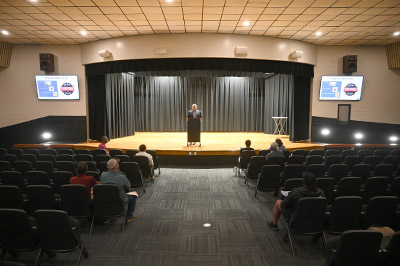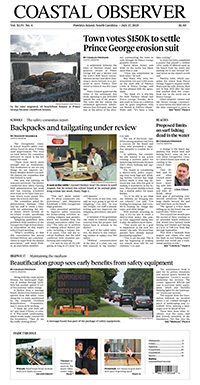Sales tax
County kicks off public meetings to explain plan for extra 2 cents

Walt Ackerman knows how he plans to vote on two sales tax referendum questions that will be on November’s ballot. He’s doing his best not to let the public know.
The first of nine meetings planned to explain the sale tax proposals between now and Election Day drew four voters to the auditorium at the former Choppee High School this week. There were also six county officials in the audience.
Under state law, public resources cannot be used to advocate for or against the ballot initiatives. They can be used to inform the public, which is what Ackerman, the county’s director of Administrative Services, will do over the next two months at venues around the county.
Meetings will be held Aug. 21 at the Murrells Inlet Community Center and Aug. 26 at the Waccamaw Library.
A 1-cent local option sales tax is proposed to offset a portion of the tax the county now collects on land, buildings and vehicles. If approved, it will stay in place until rescinded through another referendum.
A 1-cent capital projects sales tax will raise about $74 million over eight years for 22 infrastructure projects. If there is additional revenue after those projects are completed, it will be used for 19 contingency projects, all of which will be listed in order of priority on the ballot.
Based on the county’s median household income of $59,782 and an average home value of $200,000, Ackerman said most people would see a savings from the local option tax.
He estimated that households would have $6,000 in discretionary income to spend on taxable items (things other than groceries, prescription medicine and gasoline that are not taxed). The extra penny would cost them $60 a year.
The reduction in property taxes would be $381.
Prabhakar Moro, a Georgetown resident who owns a construction business, questioned how the county would be able to give back more money in property tax relief than it collects in sales tax.
Some people will pay more in sales tax, Ackerman said.
He estimated that 40 percent of the sales tax revenue will come from nonresidents, including tourists and shoppers from nearby counties.
“That’s a huge number,” Ackerman said, and it may be higher since he used data from 2022.
“I have to be very careful how I respond. Because I work for the county I cannot advocate for this tax,” Ackerman added. “You never have an opportunity from any other tax to get a discount.”
Moro asked about the impact on people who rent their homes or lease their business space.
“If you know your landlord’s getting a tax credit, is he going to go up on the rent?” Ackerman asked.
Craig Cumbie, owner of a metals business and a candidate for County Council District 3, raised the objection heard most often during previous sales tax initiatives.
“I don’t understand why we are all bent on raising taxes, any type of taxes,” he said. “The people in this county are getting their butts kicked.”
Cumbie also asked what the numbers would look like if the U.S. economy went into a recession.
“I can certainly appreciate your position,” Ackerman said. “That’s why it goes to the voters.”




